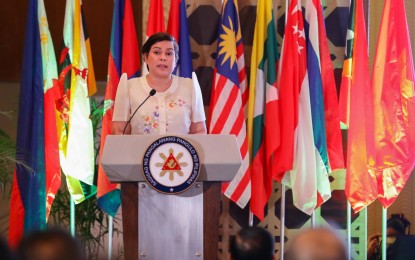
BAYANIHAN SPIRIT. Vice President and Education Secretary Sara Duterte delivers her speech before the Southeast Asian Education Ministers for the 52nd SEAMEO Council Conference on Wednesday (Feb. 2, 2023). Duterte urged the ASEAN education leaders to work together to address the learning challenges in the region using the “bayanihan spirit”. (Photo courtesy of DepEd)
MANILA – The Department of Education (DepEd) on Thursday urged leaders of the Association of Southeast Asian Nations (ASEAN) to embrace the spirit of "bayanihan" (cooperation) to improve the quality of education in the region.
In a statement, the DepEd cited how Vice President and Education Secretary Sara Duterte underscored its urgency given the impact of the coronavirus disease 2019 (Covid-19) pandemic in the education sector.
“Vice President and Secretary of Education Sara Z. Duterte calls for unity and urgency in addressing learning gaps and education equality in her message during the opening of the Southeast Asian Education Ministers for the 52nd SEAMEO Council Conference,” it said.
During the conference, Duterte highlighted how helpful bayanihan can be, especially in addressing issues in accessibility to quality education.
“In the Philippines, the term bayanihan is used to describe the acts of coming together to work for a common goal… I urged everyone to embrace the spirit of bayanihan keeping in mind who is at the heart of the work that we do. Our ASEAN learners and the future leader of our countries. Like the act of the bayanihan, let us continue to value education as a shared duty,” Duterte said.
“We need to act now. We cannot afford to waste more time. As education leaders, we cannot allow ASEAN children to miss out on the beauty and benefits of learning and the wonders of being able to use it to positively impact ASEAN and the world,” she added.
The education chief made the call following assessments of the impacts of the pandemic, including the learning gaps due to the halt in in-person classes.
“Data from UNICEF indicates that more than half of 10-year-olds in low- and middle-income countries were unable to read or comprehend a simple story even before the pandemic. In addition, learning poverty, or the inability to read and comprehend a basic text by the age of 10, has gotten worse because of the disruption in schooling and is currently thought to be close to 70 percent,” she said.
For the part of the Philippines, the DepEd vowed to intensify its efforts to realize its MATATAG (resilient) agenda, which stands for “MAking the curriculum relevant to produce job-ready, active and responsible citizens; TAking steps to accelerate the delivery of basic education facilities and provision of services; TAking good care of learners by promoting learner well-being, inclusive education, and a positive learning environment; and Giving support for teachers to teach better.”
“The Philippine government, under the leadership of our President Ferdinand R. Marcos, Jr., has committed to the MATATAG education agenda and has made a national commitment to increase investments in education… The President has emphasized that we cannot fail our children. We need to help them so that they become great,” Duterte said.
The DepEd earlier disclosed priority reforms to be pushed in the education sector during its Basic Education Report (BER) 2023.
Included on the key aspects vowed to be addressed are problems on infrastructures, including lack of adequate spaces and disaster-incurred loss; the need for revision in several parts of the curriculum; the need to intensify the protection of children’s rights and welfare; corruption; as well as lack of support to teachers, among others.
Despite these, Duterte said the administration’s initiative puts the country on-track to achieve inclusive and quality education. (PNA)
